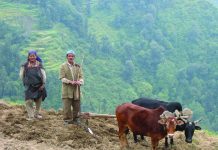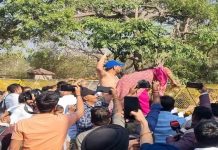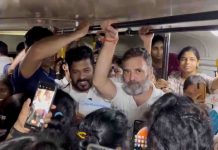 Though I keep myself far away from socialising or those endless interactions but Literature Festivals I do look forward to, for the simple reason that one gets to meet literary giants who insist on writing in their mother tongue. They are not bothered about publicity or fame but as they quip — we write for ourselves! And this in itself seems a reason enough to meet them and hear their stark views and viewpoints.
Though I keep myself far away from socialising or those endless interactions but Literature Festivals I do look forward to, for the simple reason that one gets to meet literary giants who insist on writing in their mother tongue. They are not bothered about publicity or fame but as they quip — we write for ourselves! And this in itself seems a reason enough to meet them and hear their stark views and viewpoints.
At the recently concluded Bangalore Literature Festival (October 27 and 28), I came across two extraordinary writers who write in their mother tongue and looked so content and confident. In fact, it was during lunch at the opening day of the Festival that I saw an introvert looking person sitting right in front of me. I began by asking him his name and then what he writes. All that he said was, “I’m Benyamin. I’m from Kerala. I write.” And when I queried still further and commented how difficult it gets to survive as a full-time writer, he just about smiled and nodded and added, “Written some short stories and novels in Malayalam.”
It got rather obvious that he didn’t want to talk much and as both of us focused on food, there was a slight disturbance as several other writers came rushing towards our table, congratulating Benyamin on winning the prestigious Rs25 lakh JCB Prize for Literature, for his latest novel — Jasmine Days — translated from Malayalam to English by Shahnaz Habib.
It’s then I realised that he’s that famous writer who had shot to fame with Goat Days, a novel that focused on the trauma of a migrant worker in West Asia. In fact, Jasmine Days also revolves around life and times and struggles that migrants go through whilst working in the Gulf, far away from home. Perhaps, Benyamin has experienced much of that as he was earlier working as an engineer in Bahrain but then quit to get back to his home State, Kerala, writing in that full -fledged way.
What I liked about him was his modesty which kept him from bragging about his writing prowess and popularity. After lunch as we got talking, he told me that though he was happy about the award but for him all that matters is writing and that’s about it. He seemed little bothered about anything else …and its just the writing alone that mattered. He also told me that his wife still works in the Gulf as a nurse and their two children are studying in Kerala in a boarding school.
And later that evening as he was up there on the high stage with the Bangalore-based writer, Nandita Bose, interviewing him in that conversation-style relaxed way, he spoke more and some more but again every word spoken with that mix of gentleness cum simplicity…as though he was in no mood to inflict his views on the audience. That’s a different matter altogether that the audience was all there, hearing each and every word uttered by him. It was an interesting, informal interview…with that faint boyish smile playing on his face right through.
And the next day of the BLF, I met Kannada’s famous writer — Bolwar Mahamad Kunhi. I had heard about this former banker’s writings which focus on Kannada literature; he is also credited with having introduced the Muslim ethos and culture into creative Kannada prose. And though he is famous but was absolutely down to earth and warm and friendly.
His wife was to join him later that afternoon and he called her to carry one of his books for me. This is one of his books on Mahatma Gandhi — titled — Gandhi -from Monu to Mahatma — which U.R. Ananthamurthy describes in these words — “Here is a beautiful translation from the original Kannada narration of Mahatma’s life written by Bolwar Mahamad Kunhi, one of the most gifted storytellers of Kannada.
This is a story of the amazing evolution of a great visionary and freedom fighter of India, Mahatma Gandhi. The narration of the evolution of a great soul is simple, straight-forward, unembellished but never simplistic. It is written for children but when an adult reads it the child in him is alive again. The Mahatma had also kept the child Monu alive in himself until he died as a martyr. This is a unique biography of a great visionary of our times and it reads like a fairy tale.”
And what I found touching was to see this leading writer intermingling rather too spontaneously with students and book lovers at the BLF …there wasn’t a trace of arrogance or aloofness. I suppose this is one of those essential traits to be able to write from the heart and soul and with that connect with the masses. In fact, his session at the BLF with MS Sriram drew overwhelmingly large numbers; seated in the audience were even those like me who couldn’t follow Kannada.
I sit wondering why don’t we hold regular and ongoing dialogues and discussions with the literary giants who write in the regional languages of the country? We will be blessed if we hear their thoughts and opinions and views. They are close, or shall we say closer, to ground realities and with that stark and brutally honest about the realities of the day.
letters@tehelka.com












